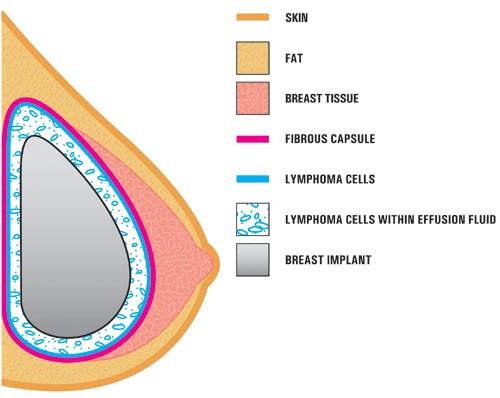Since 2011, regulatory authorities, scientific experts and manufacturers have researched the association between breast implants and a rare form of cancer known as anaplastic large-cell lymphoma. Recently, nine deaths and 359 reports of breast implant cancer have raised concerns about the knowledge and treatment of the disease.
Some doctors may not inform women of the risk of anaplastic lymphoma, making breast implant cancer awareness an essential women's health issue. Women who developed cancer after having a breast implant procedure are beginning to speak out, informing others about the risk in news coverage and online communities.
About ALCL: Research On Breast Implant Cancer
Anaplastic large-cell lymphoma (ALCL) is a rare kind of non-Hodgkin’s lymphoma. ALCL is a T-cell lymphoma affecting the immune system, which differs from B-cell breast lymphomas that develop in women without implants. On average, ALCL develops eight years after the implant has been inserted into the breast. However, it may develop within two to 28 years.
The National Cancer Institute estimates 1 in 500,000 U.S. women are diagnosed with ALCL each year. Breast ALCL affects an estimated 3 in 100 million U.S. women per year.
Though researchers have yet to determine the exact cause, possible factors contributing to ALCL include bacterial inflammation, chronic infection, immune response or genetic predispositions. Textured or roughened implants, rather than smooth-surface implants, may lead to cancer-causing inflammation. Though research about the kind of carcinogenic implant or exact is inconclusive, studies conclude the possibility of developing ALCL is greater in women with breast implants.
In 2011, regulatory agencies had identified 60 cases of ALCL in women with breast implants worldwide, which led them to analyze studies from PubMed, Embase, Web of Science and more. Researchers released three key findings:
1. Possible association.
Studies show that the incidence of ALCL is low. However, available data illustrates a consistent pattern linking breast implants to the possible development of cancer.
The cancer cells form around the breast implant, suggesting an association. If the cancer were unrelated to the implant, researchers believe it would be located throughout the breast. The type of cancer, T-cell lymphoma, is different from the majority of B-cell breast lymphomas, which develop in women without implants.

2. Texture matters.
Researchers have yet to determine if saline or silicone implant has a greater risk. Additionally, studies do not show if women undergoing breast reconstruction are more likely to develop cancer than women choosing aesthetic augmentation.
Studies show that women with textured implants are more frequently diagnosed with ALCL. Because many ALCL cases are self-reported, it’s difficult to determine how much the texture raises the risk.
3. Statistical uncertainty.
Though a possible link has been demonstrated, researchers cannot say with statistical certainty that breast implants cause ALCL. Large-scale studies including thousands of women over a decade are necessary to confirm the risk.
The FDA and the American Society of Plastic Surgeons and others are registering reports of ALCL to better understand the potential carcinogenic effects of breast implants. The agency is still reviewing medical device reports to better understand the risk.
FDA On Breast Implant Cancer Risk
Though some researchers have targeted textured implants as a risk-increasing factor, the Food and Drug Administration (FDA) does not have enough information to initiate recalls. In 2011, the agency released safety announcement summarizing research and providing recommendations to healthcare providers, along with a questions and answers update for women considering breast implants.
In March, the agency released an additional announcement encouraging women to "educate yourself about breast implants before agreeing to surgery." For those who have breast implants already, the FDA does not recommend having the implant removed if no symptoms are present.
✚
Implants may be reconstructive after a mastectomy, making it particularly difficult for women who have survived another type of cancer to deal with ALCL. Women who experience pain, swelling, lumps and the buildup of fluid should seek medical assistance. Knowing the risks, and getting an examination if you experience symptoms, can lead to early diagnosis and treatment of ALCL. The good news is ALCL is not often fatal.
Only about 30 percent of plastic surgeons were routinely discussing the cancer risk patients in 2015, according to Dr. Mark W. Clemens II, a plastic surgeon interviewed by The New York Times.
The bad news, however, is that some doctors may not know how to diagnose and treat ALCL. Experts recommend removing the implant and surrounding scar tissue, which is often curative. Some women told the New York Times they underwent numerous rounds of chemotherapy and radiation before the implants were removed.
Women have a right to be informed of the risks and, if diagnosed with ALCL, to be treated properly. Please feel free to contact MedTruth advocates for more information.
